Best Beef Jerky Nutrition Facts
/beef-jerky-16e6532a3ad94e8cb95d71c14c867354.jpg)
Beef Jerky Nutrition Facts Calories, Carbs, and Health Considerations
Beef Jerky Protein Content. You get about 9.4 grams of protein per 1 ounce of beef jerky. The recommended protein DV is 50 grams. A snack-sized bag of jerky usually holds 3 to 4 ounces, and a bigger bag holds about 8 ounces. So when you eat a snack-sized bag of beef jerky, you also enjoy most of your protein DV!
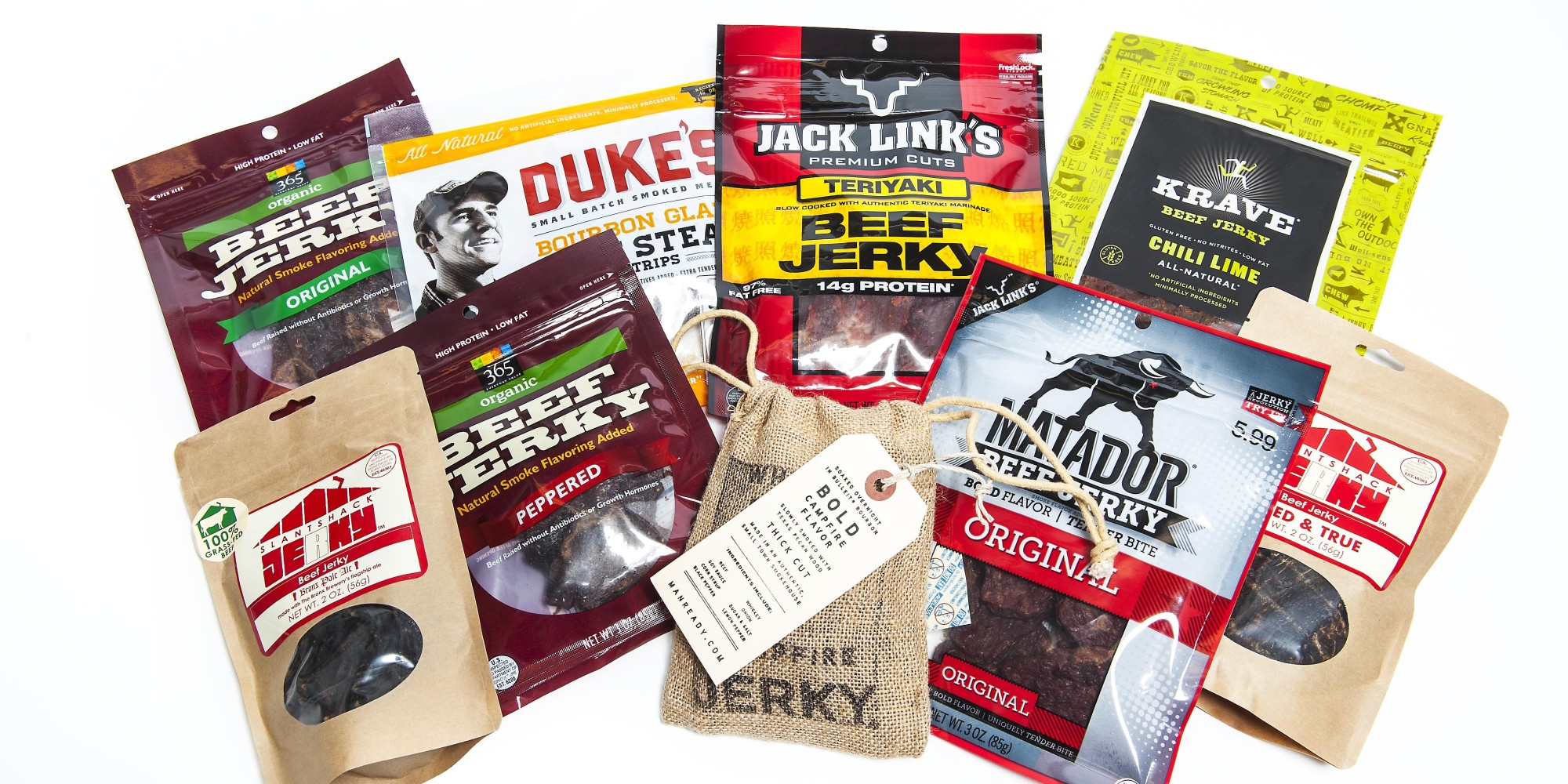
Taste Test The Best And Worst Beef Jerky (PHOTOS) HuffPost
The type of beef jerky you choose often depends on nutritional and flavor preferences. But you may also consider these factors: Low-sodium beef jerky is available commercially. Look for jerky with less than 140 mg per ounce. Check the serving size to ensure this is met. Low-sodium jerky recipes and packaged cures are also available. Be sure to.
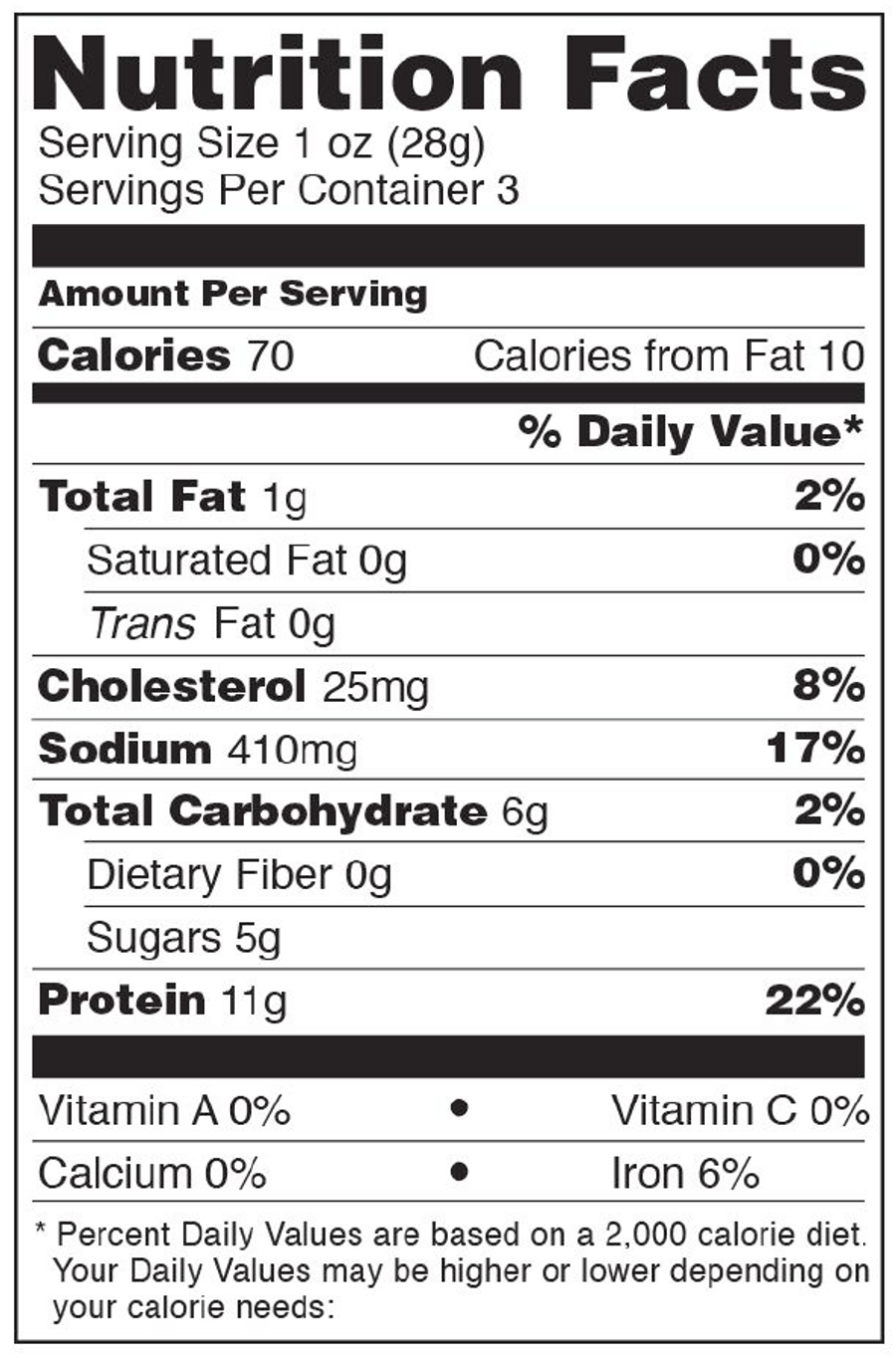
Original beef jerky Sunbasket
But, the beef jerky nutrition facts also consist of other critical data. Beyond the primary macros, beef jerky is also a treasure trove of essential vitamins and minerals. It's rich in iron, zinc, and B-vitamins. These all play a role in improving blood health, wound healing, and energy production. Iron, for instance, is crucial for.
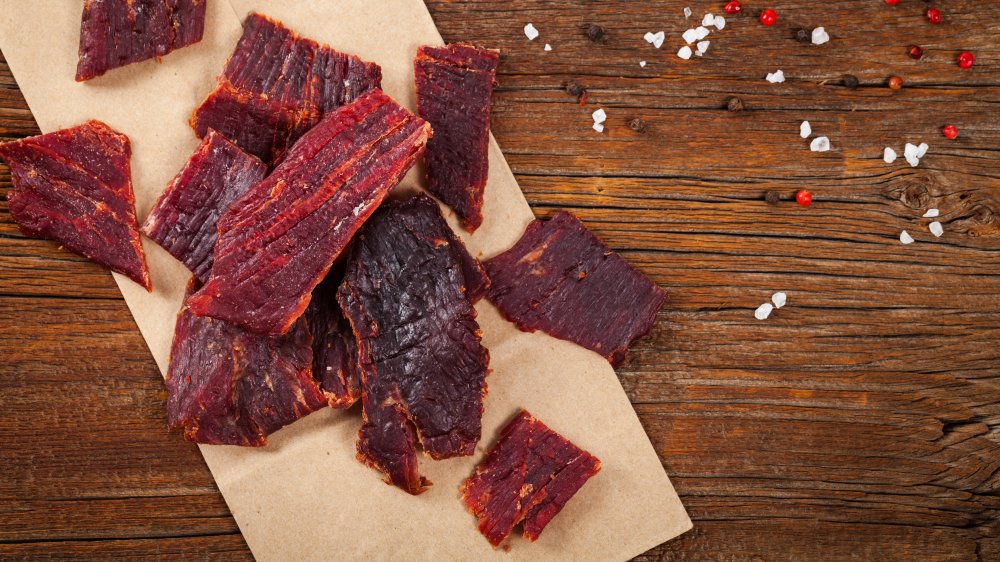
This Is How Beef Jerky Is Really Made
2. Is beef jerky high in protein? Yes, beef jerky is a high-protein snack. It is packed with essential amino acids, which are necessary for muscle growth and repair. A serving of beef jerky can provide around 10 grams of protein, making it a great option for those looking to increase their protein intake. 3. Does beef jerky contain a lot of fat?

Rhett & Link Rank Their Favorite Beef Jerky
A 1-cup (90-gram) serving of beef jerky provides 369 calories, 30 grams of protein, and 23 grams of fat. Approximately 33% of beef jerky calories are from protein, and 56% from fat.

Everything We Know About BucEe's Famous Jerky
5. The Beef Jerky Industry Is Booming. The beef jerky industry is a force to be reckoned with, second only to potato chips in the snack market. In the US alone, beef jerky companies generated $1.4 billion in revenue in 2018, a figure that's expected to grow by 4.2% every year until at least 2022.

71 best Pictures & Jokes images on Pinterest Funny stuff, Ha ha and
The more natural the better. On average, a 1 oz. (28g) serving of beef jerky contains the following nutrients. Beef Jerky Nutrition Facts. Calories in Beef Jerky: 80. Carbohydrates in Beef Jerky (g): 6. Protein in Beef Jerky (g): 11. Fat in Beef Jerky (g): 1.5. Saturated Fat in Beef Jerky (g): 0.

Beef Jerky Jerky Store Europe
Place in a bowl or ziplock bag. Remove the meat from the freezer and slice ¼" strips against the grain for an easy chew. Cut with the grain for a more chewy jerky. Add sliced beef to the mixture in the ziplock bag or bowl and marinate for 8-24 hours in the refrigerator.

Beef Jerky Nutrition Facts What to Eat, What to Avoid CHOMPS
Place a wire rack over each pan. Preheat the oven to 175°F and set two oven racks in the centermost positions. Arrange the marinated meat on the wire racks in a single layer. Bake, rotating the pans from front to back and top to bottom midway through, until the meat is dried out, 3 to 4 hours.
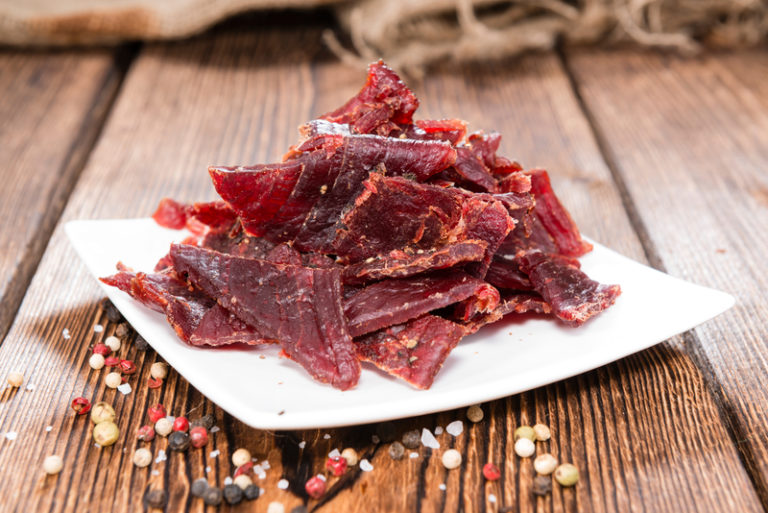
Is Beef Jerky Good for You? See the Health Facts BioTrust
Nutrition Facts: Jerky By the Numbers Here is the nutritional information in 1 cup (90 g) of an average serving of beef jerky - as provided by the USDA. 369 Calories 23 g Fat 10 g Carbohydrates 1870 g Sodium 2 g Fiber 30 g Protein 8 g Sugar Keto-Friendly Beef jerky is a low-carb food, with one piece of it having only 2 g of carbohydrates.

How Many Calories Is In Beef Jerky Beef Poster
55 grams of carbohydrates (about 50% DV of a normal carb diet and 100% DV of a low-carb diet) Though producer dependent, most beef jerky is relatively low in fat (compared to other beef products), low in carbs, and high in protein. Beef jerky is also particularly high in several micronutrients including magnesium, B12, choline, zinc, and iron.

Best Beef Jerky Nutrition Facts
Generally speaking, beef jerky is a healthy and nutritious snack. One ounce (28 grams) of beef jerky contains the following nutrients ():Calories: 116 Protein: 9.4 grams Fat: 7.3 grams Carbs: 3.1.
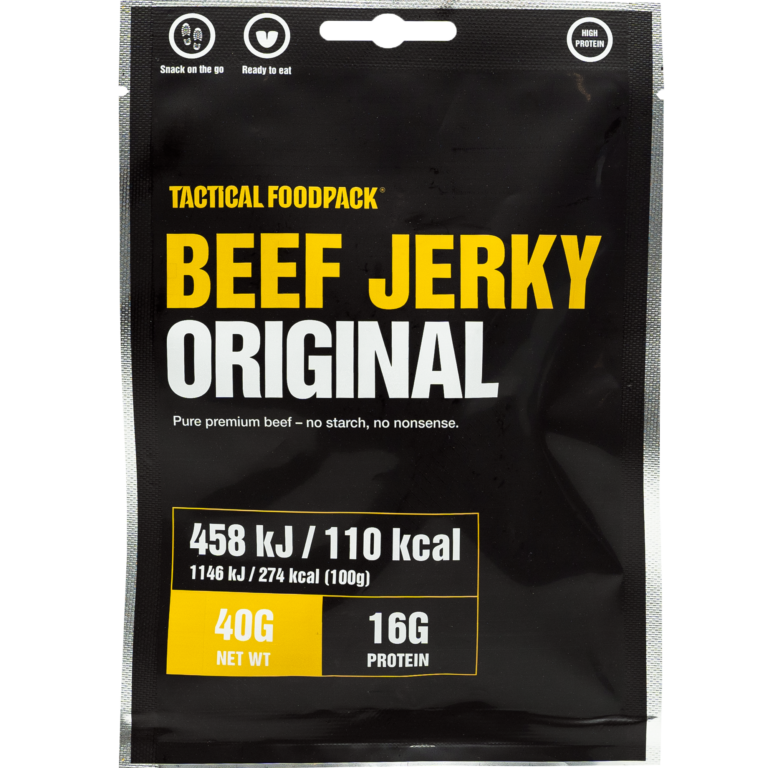
Beef Jerky Original 40g Tactical Foodpack
Beef Jerky Nutrition Facts. One ounce of beef jerky, which is about a quarter cup, is equal to a single serving. An ounce of plain beef jerky contains: Calories: 116. Total fat: 7.3 g. Cholesterol: 13.6 mg. Sodium: 507 mg. Total carbs: 3.1 g. Dietary fiber: 0.5 g.

Value Jerky Beef Jerky Strips Nutrition Facts Eat This Much
Get full nutrition facts and other common serving sizes of Beef Jerky including 1 oz and 100 g. Register | Sign In. Search in: Foods Recipes Meals Exercises. There are 82 calories in 1 piece of large Beef Jerky. Calorie breakdown: 57% fat, 11% carbs, 33% protein. Common Serving Sizes: Serving Size Calories; 1 piece large: 82: 1 oz: 116: 100 g:
/beef-jerky-9a08dfe3180f4d97baf914b1dd711876.jpg)
The Best Beef Jerky in 2022
How they make the jerky will also impact the nutritional content due to the cut of meat used and the curing process. You'll need to refer to the nutrition label to find out the precise ingredients used and the nutrition facts for each product. That said, the USDA does provide some generic beef jerky nutrition facts. A 1oz piece of beef jerky.

Original Beef Jerky High Protein Meat Snacks Jack Link's
Jerky Fact #7: Jerky is a really great source of protein. Jerky is an excellent source of protein. During World War I, the military gave soldiers beef jerky as one of their primary sources of protein to fuel up on the front lines. Jerky is still known as a great source of protein, and Women's Health even ranks beef jerky as a top high-protein.